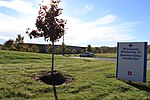Holden Woodville Plant
 From Wikipedia the free encyclopedia
From Wikipedia the free encyclopedia
The Holden Woodville Plant was a manufacturing facility owned by the Australian motor vehicle manufacturer Holden situated in Cheltenham, South Australia, a suburb of Adelaide.
Etymology[edit]
Although the plant is named after the Australian town of Woodville, South Australia, the actual plant was located in the adjacent suburb of Cheltenham.[1]
History[edit]
In 1923,[2] Holden's Motor Body Builders Ltd (HMBB)[3][4][5] established a 23.5-acre (9.5 ha) site known as the Holden Woodville Plant, expanding to 40 acres (16 ha) and employing 5,500 people three years later, which had an impact on all of the surrounding suburbs.[2]
The Woodville plant got its first orders from General Motors. When Holden became the exclusive supplier of car bodies for General Motors, all of them were manufactured at the Woodville plant,[6] from around 1949.[7] The very first Holden car was completed and delivered from the Woodville plant in 1948.[6]
The plant grew and developed largely under the guidance and vision of the Australian motor engineer Sir Laurence Hartnett, who was instrumental in the success of the Australian automobile industry. It was largely due to Hartnett that Holden went from a minor Australian marque to a significant competitor in the global car market.[8]
Between 1959 and 1965, all non-obsolete equipment was moved to Holden's new Elizabeth plant. However Woodville continued to produce replacement parts for discontinued models. The Holden TriMatic transmission was produced at the plant until 1987, although the site was sold off in 1984.[citation needed] Through the 1980s, Holden progressively moved its operations to its Elizabeth plant, leading to the closure of Holden Woodville Plant.[2]
The plant was finally demolished in 1991.[7]
Achievements[edit]
During the 1950s, the Woodville plant assembled approximately 10 per cent of all Holden vehicles assembled in Australia.[7]
Although the Woodville plant was closed along with several other plants such as the Elizabeth manufacturing plant, the plant has lived on in the folklore of Australian industry veterans and in their collective memory.[9]
See also[edit]
References[edit]
- ^ Jensen Planning and Design (December 2010). Woodville Village Masterplan: Final Report (PDF). City of Charles Sturt. p. 29.
- ^ a b c "A brief history of the suburb Woodville" (PDF). City of Charles Sturt. Local History Factsheet. Archived from the original (PDF) on 9 April 2019. Retrieved 19 December 2022.
- ^ Daley, Frank (February 1967). "The Holden Saga". The Victorian Historical Magazine. LIV: 49.
- ^ Darwin (2002), p. 3.
- ^ "The Holden car in Australia". Government of Australia. Archived from the original on 20 July 2008. Retrieved 23 August 2008.
- ^ a b Byrne, Bob (12 December 2013). "Look back at Holden's golden years". Adelaide Now.
- ^ a b c "Piece of Port history to feature in new harbourside development". Our Port. 31 January 2020.
- ^ "Holden and Australia's history of car manufacturing". www.abc.net.au. 7 October 2017.
- ^ "Historians on drive for Holden worker memories". InDaily. 25 September 2019.
Further reading[edit]
- Collins, Carolyn; Sendziuk, Paul (2021). "'It's Like Having Your Home Knocked Down': Place, Identity and Community at General Motors-Holden's Woodville Factory" (PDF). Studies in Oral History (43): 57–84. (Whole journal here)
External links[edit]
- Woodville plant, South Australia • Mixed material • State Library of South Australia
- [Photographs of the Woodville plant prior to World War II] • Photograph • State Library of South Australia
- Woodville Holden plant
